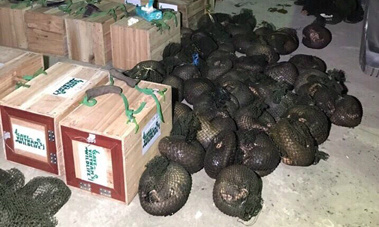
Police in the northern province of Hoa Binh on Wednesday seized 118 pangolins smuggled in a car during a long chase that ended with the police shooting two of the car’s tires.
Officers were chasing after the car for dozens of kilometers after it had refused to stop for a check on Wednesday night, the police said in a statement.
The car subsequently crashed into a motorbike and a parked car, causing slight damage to both vehicles.
The police said they decided to shoot one of the car’s tires after the driver did not stop at a warning shot. He only stopped after two tires of the car were shot flat.
Two men then got out of the car to run away. Police have arrested the driver and are still looking for the other.
A total of 118 pangolins, weighing more than 550 kilograms, were found tied in bags. Five of them were already dead.
Vietnam is home to Javan and Chinese pangolin species, both of which are listed by the International Union for Conservation of Nature as critically endangered, and their populations have fallen rapidly in recent years.
The defenseless anteaters are the biggest victim of wildlife trafficking as their meat is considered a delicacy by some while their scales are used to make boots and shoes. Many also believe that the scales can be used as an effective treat for conditions such as psoriasis and poor circulation in traditional Chinese medicine, despite the lack of scientific evidence.
Education for Nature-Vietnam, one of Vietnam’s few locally based conservation groups, said that the country is a transit point for pangolin trafficking networks.
Hanoi customs on Tuesday found two shipments full of pangolin scales sent to Noi Bai Airport from Ghana. In early March, a shipment from Cameroon to Noi Bai was also found to contain 375 kilograms of pangolin scales.
AFP said in a recent report that around one million pangolins have been poached from Asian and African forests over the past decade, putting them on the list of species at the highest risk of extinction.



